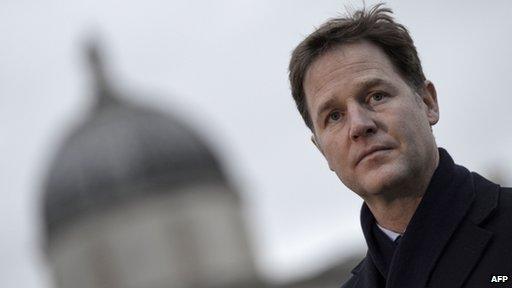Net firms condemn revival of 'snoopers' charter'
- Published

Nick Clegg has attacked plans to scoop up more data about Britons
UK net firms have criticised attempts to revive a "snoopers' charter" by adding it into draft legislation currently before the House of Lords.
Amendments to the Counter Terrorism and Security Bill would, if passed, make ISPs log more of what people do online.
It would also make the logged data more easily accessible to law enforcement and security services.
The 18-page addition was "ill-judged" and "regrettable" said the ISP Association (Ispa).
The Open Rights Group, which campaigns on issues of digital freedom, said the amendment was an "abuse of procedure".
Action needed
The amendment to the Counter Terrorism Bill has been proposed by a group that includes a former Conservative defence secretary, a former Metropolitan police commissioner, a former Labour defence minister and a Liberal Democrat peer.
The amendment comes as the UK intelligence services seek more powers to gather and analyse data which they say is needed to thwart attacks such as those seen earlier this month in Paris.
Ispa said the clauses inserted in the Counter Terror Bill were lifted from an earlier draft Communications Bill that a joint Lords and Commons committee scrutinised in 2012. It said that Committee called for more consultation with experts and industry before the proposals could become part of any draft legislation.
The industry group said the committee had "substantial concerns" about the collection of data on web browsing habits and how access to this stored information would be controlled.
"We urge Parliament to reject this attempt to insert complex legislation into an existing Bill at the last minute," said Ispa in a statement.
The Open Rights Group also criticised the amendment saying in a statement: "The Lords cannot have time to properly consider the bill, and would deny the Commons the opportunity to consider the clauses as well."
The amended Counter Terrorism Bill is due to be debated in the House of Lords on Monday.
Lord Carlile, a spokesman for the group behind the amendment, that action was needed now and that it had re-worded the amendment to remove parts that were found to be unacceptable.
The increased powers to inspect gathered data would be confined to the police and intelligence services, he said.
- Published20 January 2015
- Published18 January 2015
- Published13 January 2015
- Published16 December 2014